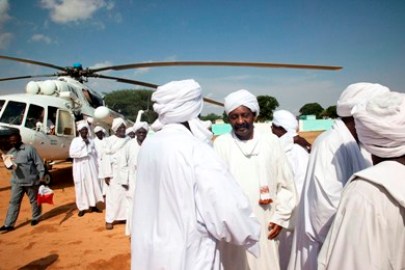Rival Darfur tribes sign reconciliation deal in West Kordofan
September 27, 2014 (KHARTOUM) – A reconciliation agreement between Hamar and Ma’alia tribes has been signed on Saturday in West Kordofan state capital of al-Foula in the presence of Sudan’s second vice-president, Hassabo Mohamed Abdelrahman.

Intermittent clashes have been erupting between Hamar tribe which dwells in West Kordofan state and Ma’alia tribe which inhabits in East Darfur. The fighting was triggered by a land dispute.
The governor of West Kordofan state, Ahmed Khamis, acknowledged in 2013 that clashes between the two tribes erupted following discovery of oil in the region.
Last July, the Hamar and Ma’alia tribes signed an agreement in the Sudanese capital, Khartoum aimed at ending the bloody fighting which has been ongoing for two years.
The two tribes on Saturday agreed to open a new page of social peace and peaceful coexistence, underscoring commitment to implement the outcome of the reconciliation conference.
They also emphasized determination to respect mutual relations, stop bloodshed, and promote ties to achieve social cohesion.
The reconciliation deal was signed by Hamar chief, Abdel-Gadir Moniem Mansur, and Ma’alia chief, Abdel-Mannan Musa Sighairon, in the presence of the 2nd VP, the governor of West Kordofan Ahmed Khamis, and the governor of East Darfur, Al-Tayeb Abdel-Karim.
TENSIONS BETWEEN MA’ALIA AND RIZEIGAT
Meanwhile, the spokesperson of Rizeigat tribe Shura (consultative) council, Younis Farah abdel-Karim, accused Ma’alia tribesmen of looting a train carrying 500 sheep at the road linking al-Nuhood town in West Kordofan state to North Kordofan state capital of al-Obayid.
He said at a press conference in Khartoum on Saturday that authorities were aware of the incident and have not taken any action, adding that the issue will be addressed by the traditional administration.
In July, Hassabo Abdel Rahman tried to mediate between the two tribes and organise a reconciliation conference in al-Foula.
However, the meeting was cancelled after the Rizeigat rejected the participation of some Ma’alia members, saying they belong to another tribe. The Ma’alia were also skeptical about the involvement of the second vice-president, who is a member of Rizeigat tribe.
The two tribes also failed to hold another conference scheduled for August 10th.
Both the Rizeigat and the Ma’alia are pastoralist tribes, based in East Darfur. The centre of Rizeigat territory is in Ed Daein town, the capital of East Darfur, while the Maalia centre is in Adila, the second largest town after Ed Daein.
Clashes between the two tribes generally erupt over land ownership. Last month, the United Nations said that more than 300 people were killed and hundreds others injured in fighting between Rizeigat and Ma’alia tribes in East Darfur state.
Armed clashes between the two tribes in 2013 killed over 149 people and forced an estimated 51,000 people to flee their homes and seek shelter in Adila, Abu-Karinka and Ed-Daein localities.
(ST)
